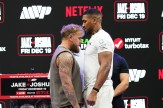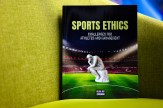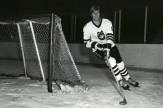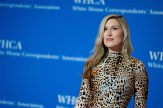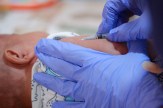The ‘curse of the Beanpot’ broken, three Northeastern players relive their 1988 glory
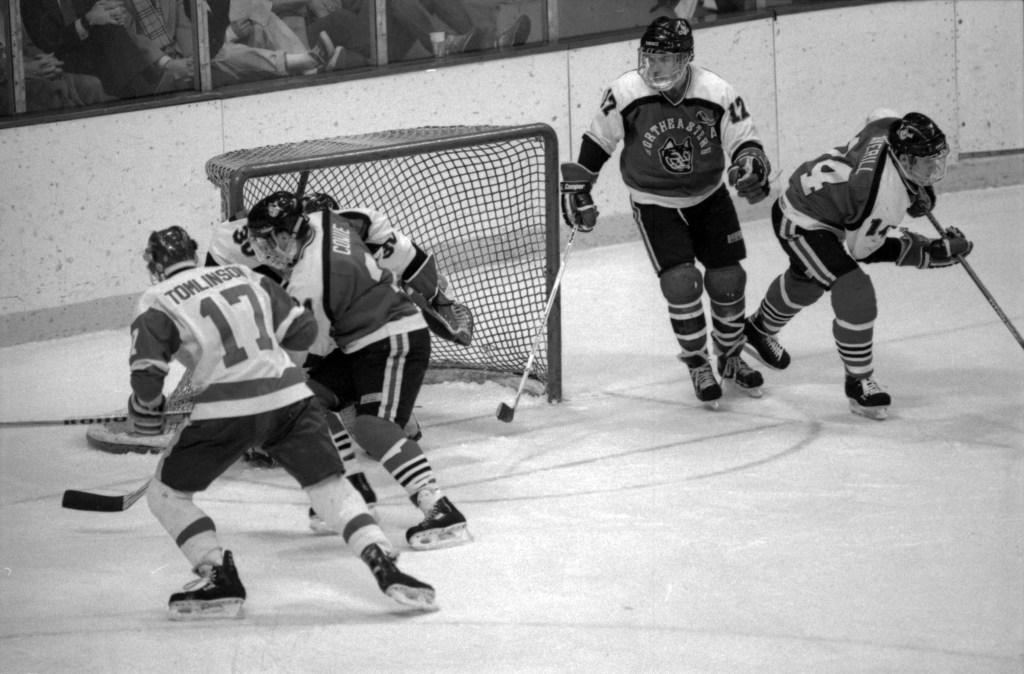
For decades, Bruce Racine blamed Northeastern’s Beanpot drought on what he calls “the curse of the beans.”
In the locker room ruckus following the Huskies’ 1988 victory over Boston University, while Racine and his teammates celebrated, his brother stole a can of Boston Baked Beans from the Beanpot and took it home to Ottawa. A year later, his sister ate the beans and tossed the can in the trash.
“My family cursed Northeastern when my brother took the beans,” joked Racine, who recovered the empty can and now keeps it on a trophy shelf at his home in St. Louis. “It’s neat that the curse is over and the pressure is off.”
For Racine and two of his 1988 teammates, Rob Cowie and David O’Brien, Northeastern’s defeat of crosstown rival Boston University in the 2018 Beanpot Championship brought a jolt of pride sharper than an open-ice hip check. But watching a new generation of Huskies recapture Boston’s most coveted 20-pound trophy also provided them an emotional milestone in successful lives permeated by a love for hockey.
“It was a relief for all former players, students, and alumni,” said O’Brien, the captain of the 1988 team. “When all you’re hearing is ’30 years,’ it can wear on you.”
Payback
Of the three, Racine came closest to professional hockey’s pinnacle, when he suited up as the backup goalie on the 1991 Pittsburgh Penguins team that won the Stanley Cup. Though he didn’t play, he has the ring.
One of Racine’s most vivid recollections of his brief NHL career took place in the old Boston Garden, where he had led the Huskies to their 1988 Beanpot victory. Playing goalie for the St. Louis Blues in 1995, Racine recorded his first NHL save, off the stick of Bruins star Cam Neely, who signed the puck for him after the game.
“It’s funny that I ended up playing my first game in Boston,” said Racine, who graduated from Northeastern in 1989 with a degree in speech communication. “As I skated to the crease, I kept telling myself that I had waited my whole life for this.”
Racine’s professional career lasted 15 years and took him from the United States to Finland. After retiring from pro hockey, he founded the Racine Goalie Academy in St. Louis. Among his clients are two NHL draftees.
“St. Louis isn’t a traditional hockey market,” he said, “but it’s growing a lot and business is going well.”
During a goalie clinic in February, Racine ran into a longtime friend, Keith Tkachuk, a retired NHL star who played college hockey at Boston University. “He always razzed me about the Terriers winning the Beanpot,” Racine recalled. “This time, I got to razz him back.”
“We got it”
Cowie remembers the 1988 Beanpot Championship as though it were yesterday.
The old Garden was hot, he said, the ice slushy. The capacity crowd of 14,451 loomed over the players like hawks.
“You’re worried about dehydration because you’re so amped up,” he recalled. “You’re burning three times the normal number of calories in the warm-up because the place was rocking.”
Like Racine, Cowie has a fond recollection of playing professional hockey in Boston. One of his seven NHL goals came in his return to the city in 1995. When his slap shot from the blue line found the net, many of his former teammates were there to cheer him on.
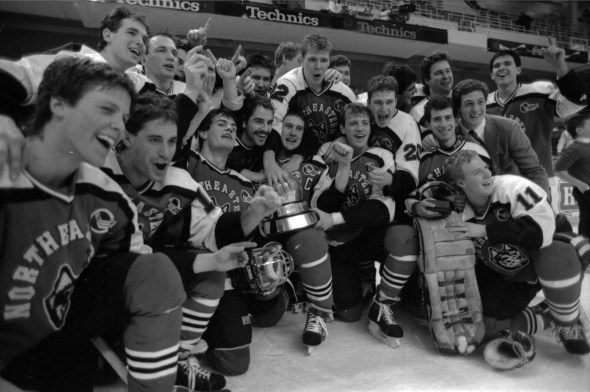
“We have a bond that can never be broken,” said Cowie, who graduated from Northeastern in 1991 with a degree in business administration.
The second-highest scoring defenseman in Huskies history, Cowie played professional hockey for 14 years, including parts of two seasons with the Los Angeles Kings.
After playing in Switzerland, Germany, and Italy for eight years, Cowie retired in 2004 and vowed to stay in the game. “I have a love affair with the sport,” he said. “Hockey is woven into the fabric of who I am.”
For the past three years, he’s traveled the world as a professional scout for the Nashville Predators, looking for the best talent in North America and Europe. Nothing compares to the joy of playing on a tight-knit team, Cowie said. But scouting “is as close as you can get to duplicating that feeling.”
When the Huskies won the Beanpot this year, Cowie texted “We got it” to David Poile, the Predators’ general manager and a fellow Northeastern hockey alumnus.
“I was so happy,” said Cowie. “The scouting world is full of Boston College and Boston University alumni who have been hogging the trophy for the past 30 years.”
‘I love coaching my kids’
O’Brien, a forward on the 1988 team who scored two goals in the Beanpot final, remembers hoisting the Beanpot high over his head.
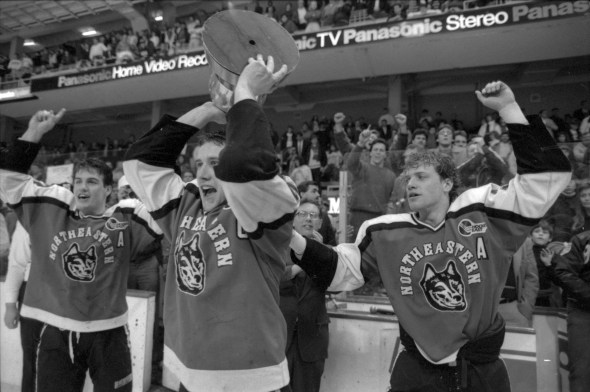
“It was a lot heavier than I thought it would be,” he recalled.
He misses the 1988 team, especially the late-night card games and group dinners at campus restaurants. He calls his teammates a “close-knit group of guys who really enjoyed being around each other.”
Like Racine and Cowie, O’Brien cherishes the Beanpot as much as anything he accomplished in his professional hockey career.
“It’s a feeling I’ll remember for the rest of my life,” he said.
After graduating in 1989 with a degree in criminal justice, O’Brien played five years of professional hockey in North America and Germany.
He then changed tracks, earning his juris doctor at New England Law School and making partner at Peabody & Arnold, one of Boston’s oldest law firms.
O’Brien hasn’t played professional hockey in more than 20 years, but his love for the sport is something he’s passed down to his children.
He coaches his three sons—8-year-old Sebastian, 10-year-old Max, and 14-year-old Ben.
In the fall, his kids fantasize about becoming soccer or football stars. In the winter, they dream of playing in the NHL.
“I love coaching my kids and watching them compete and improve,” he said. “In any sport they play, I tell them to work hard, play with passion, and be a good teammate—things my Northeastern coaches tried to instill in me.”
O’Brien watched Northeastern’s 2018 Beanpot victory at home with his children. “I think they showed resilience and leadership and were able to block out the noise to play their best game,” he explained. “It was awesome.”
